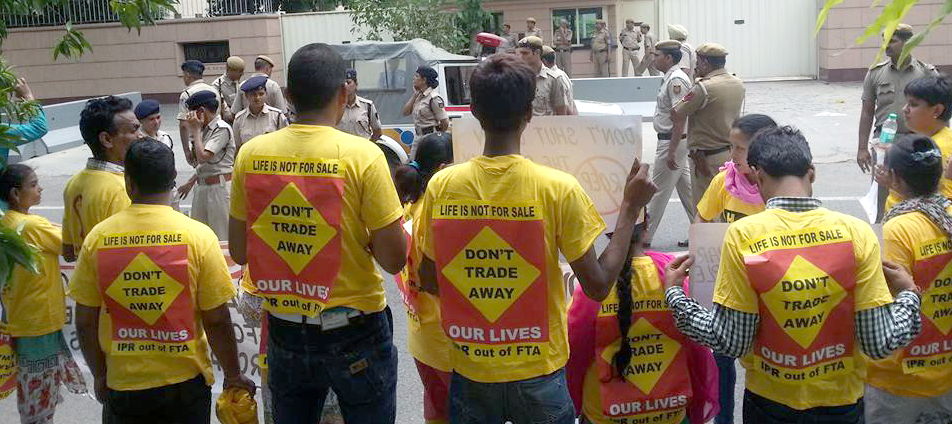Negotiating in secret: economy faces RCEP dangers
Business World (India) | 17 Jun, 2015
Negotiating in secret: economy faces RCEP dangers
India’s RCEP engagement is a classic example of contradicting policies of the Modi government, G. Manicandan argues
The eighth round of negotiations on the Regional Comprehensive Economic Partnership (RCEP) agreement concluded last week in Kyoto, Japan. If reports are to be believed the negotiations are to be concluded by the end of 2015. RCEP negotiations raise concerns with regard to their content and process.
The RCEP is negotiated among 16 governments i.e. 10 ASEAN countries and Australia, China, India, Japan, the Republic of Korea and New Zealand. This agreement is termed as one of the mega FTAs next to the Trans Pacific Partnership (TPP) and Trans Atlantic Trade and Investment Partnership (TATIP). However, even after 8 rounds one does not find enough information on this FTA.
As the name suggests, the RCEP comprehensively covers almost every aspect of economy such as goods, services, investment, economic and technical cooperation, intellectual property, and competition and dispute settlement. It proposes liberalization of trade beyond India’s obligation under WTO and existing FTAs with Japan, South Korea, ASEAN, Singapore, Malaysia, Thailand etc. Further, it also proposes India to undertake legally binding obligations on investment and competition law and do away with public interest safeguards in intellectual property law such as Patents Act and Copyrights Act.
Destroying India’s Manufacturing
The RCEP bears the danger importing provisions of the TPP and setting norms and standards at par with the TPP because out of 16 RCEP negotiating countries 7 members - Australia, Brunei, Japan, Malaysia, New Zealand, Singapore and Vietnam - are participants in the TPP. Further, South Korea has an FTA with the US. These countries would push for an ambitious trade liberalization program with elimination tariffs in almost all sectors. This would be the final nail in the coffin of India’s manufacturing sector. In other words, India’s RCEP engagement is a classic example of contradicting policies of the government. On the one hand the prime minister is promoting "Make in India" and on the other hand he is engaged in a FTA negotiation that has the potential to eliminate any revival of Indian manufacturing, especially in the technology-intensive sectors.
India is already facing trade deficit with almost all RCEP partners in general, and with China in particular. The RCEP has the potential to permanently damage the Indian manufacturing sector. Manufacturing capabilities of ASEAN members, China, Japan, South Korea are advanced. So, possibilities of gaining new market access through the RCEP are simply not there.
Further, the RCEP also raises critical concerns about the livelihood of farmers and deepen the agrarian crisis. The dairy products from New Zealand and Australian and other agriculture products from ASEAN countries can deepen the ongoing agrarian crisis in the country.
The leaked intellectual property rights (IPR) text proposed by Japan and South Korea confirms the concern that the strict IPR provisions proposed in the RCEP are almost similar to that of the TPP and compromises India’s efforts to catch up in technology.
Risks To Pharmaceutical Sector
Further, if operational, these provisions would compromise access to medicines at affordable prices. Apparently, the leaked IPR text proposes patent term extensions, data exclusivity and lowering of the patentability criteria. These provisions will wipe out India’s generic pharmaceutical production and severely restrict access to medicine at affordable prices.
RCEP negotiations are taking place at great speed in a secretive manner with little regard for transparency. Till date there is no official release of negotiating documents, thus making people and businesses clueless with regard to the implications of RCEP. Even India’s parliament has not been informed about the RCEP. The most unfortunate fact is that, the government admitted that no impact assessment study has been carried out to prior to the decision on joining RCEP negotiations.
India’s gain from the new generation FTAs known as Comprehensive Economic Partnership Agreements (CEPA) is a big question mark. Among these FTAs India enjoys trade surplus only with regard to Singapore and Sri Lanka. India has a trade deficit with all other new generation FTA partners such as South Korea, Japan, ASEAN, Malaysia and Thailand. Till date no systematic assessment of cost and benefits of these FTAs has been carried out. During the UPA time the Parliamentary Standing Committee on Commerce initiated an investigation into India’s FTA engagements. The Standing Committee Report is yet be finalised. Even Commerce Minister Nirmala Sitharaman has admitted that India’s is not gaining from FTAs.
Instead of blindly following the trade liberalization agenda and justification of the RCEP engagement as part of "look east policy", the government should look at the empirical evidence and review its FTA engagements, including the RCEP. Further, government should put an end to secret negotiations and ensure transparency. In this regard, the government should publish all the negotiating texts and analytical studies regarding the RCEP should be made public. The government should not sign away peoples’ livelihood and country’s development policy space.
The author, G. Manicandan, is coordinator of the Forum Against FTAs






